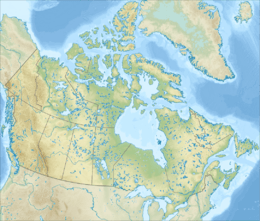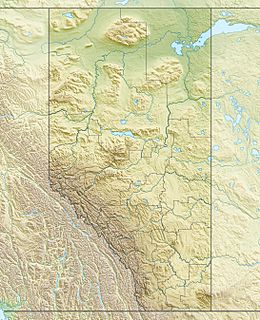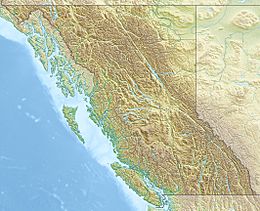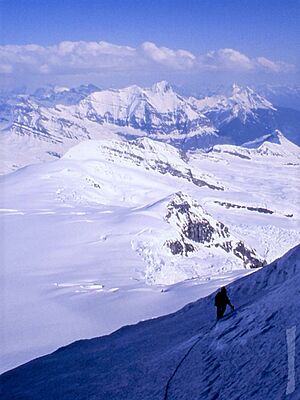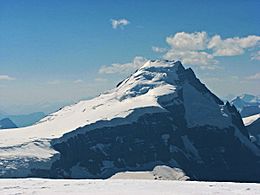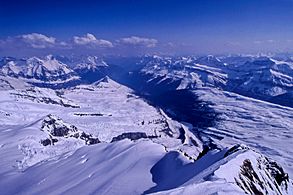Mount Columbia (Canada) facts for kids
Quick facts for kids Mount Columbia |
|
|---|---|
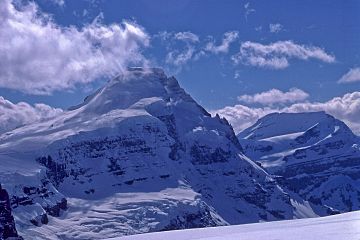
Mount Columbia & King Edward in background
|
|
| Highest point | |
| Elevation | 3,747 m (12,293 ft) |
| Prominence | 2,383 m (7,818 ft) |
| Listing |
|
| Geography | |
| Country | Canada |
| Parent range | Winston Churchill Range (Canadian Rockies) |
| Topo map | NTS 83C/03 |
| Climbing | |
| First ascent | 1902 by James Outram, guided by Christian Kaufmann |
| Easiest route | snow/glacier climb |
Mount Columbia is a huge mountain in the Winston Churchill Range. This mountain range is part of the famous Rocky Mountains. Mount Columbia is the tallest point in Alberta, Canada. In the entire Canadian Rockies, only Mount Robson is taller.
This amazing peak sits right on the border between Alberta and British Columbia. It's also on the northern edge of the huge Columbia Icefield. Even though it's on the border, its very highest point is inside Jasper National Park in Alberta.
The mountain got its name in 1898 from a person named J. Norman Collie. He named it after the Columbia River. The river itself was named after an American ship called the Columbia Rediviva. Its captain, Robert Gray, explored the river in 1792. Mount Columbia was first climbed in 1902 by James Outram, who was guided by Christian Kaufmann.
Climbing Mount Columbia
The most common way to climb Mount Columbia is up its east face. This route involves climbing a glacier and is not too difficult in the summer. However, it's a very long walk to get there, about 19 kilometres (12 miles). You have to go across the Athabasca Glacier and then over the Columbia Icefield.
If you camp near a place called King's Trench, you can make the walk shorter, down to about 5 kilometres (3 miles). There's also a harder way to climb the mountain called the North Ridge. This route is more technical and is considered more exciting for experienced climbers.
How Mount Columbia Formed
Mount Columbia is made of sedimentary rock. This type of rock forms from layers of sand, mud, and shells that settle at the bottom of ancient seas. Over millions of years, these layers hardened into rock.
The rocks that make up Mount Columbia were formed during different time periods, from the Precambrian era all the way to the Jurassic period. Later, during a time called the Laramide orogeny, these rock layers were pushed up and over younger rocks, creating the huge mountain we see today.
Weather at Mount Columbia
Mount Columbia has a subarctic climate. This means it has very cold and snowy winters. The summers are usually mild. Temperatures can drop below -20 °C (-4 °F). With the wind chill, it can feel even colder, sometimes below -30 °C (-22 °F).
Images for kids
-
Mount Columbia, seen from the top of Snow Dome
See also
 In Spanish: Monte Columbia (Canadá) para niños
In Spanish: Monte Columbia (Canadá) para niños
 | Kyle Baker |
 | Joseph Yoakum |
 | Laura Wheeler Waring |
 | Henry Ossawa Tanner |


